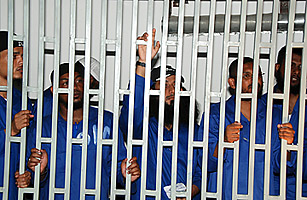
Fireworks lit up the skies of the Yemeni capital of Sana’a on Tuesday night as Yemeni government officials claimed that President Ali Abdullah Saleh, recovering from wounds he sustained in an attack on his palace earlier this month, would be returning to the Yemeni capital on Friday, June 24. The president’s supporters made a raucous display of their joy by shooting barrages of AK-47 rounds into the air, similar to their display of support when news of his successful surgery reached the capital.
Just hours after the celebrations began, however, in the southeastern city of Mukalla, about 300 miles to the east, more than 60 detainees being held in a central prison were sprung from their cells by a group of Al-Qaeda militants, according to Yemeni security officials. Fighting broke out between the armed men and security soldiers as dozens of prisoners fled in the ensuing chaos. “A group of al-Qaeda members rushed in just before 8 a.m. to free prisoners who also were members of Al-Qaeda in the Arabian Peninsula , the terrorist group’s regional franchise. We exchanged fire with the gunmen and killed two of those attempting to free prisoners. Two of them were captured and are currently under interrogation. 68 prisoners escaped in total,” said one high ranking security officer in Mukalla, speaking on the condition of anonymity.
Residents in the area also reported hearing heavy gunfire in the early morning hours on Wednesday while others claimed that groups of men were seen fleeing the prison at that time. Several of the escapees were convicted terrorists while others were being held pending trial. The Yemeni Defense Ministry claimed that a tunnel was dug under the walls of the prison. Militants emerged from the tunnel and opened fire on prison guards, killing one.
Prison breaks have a sordid history in Yemen. In 2006, 23 men being held in the capital’s infamous political security prison escaped via underground tunnel. Out of this prison break, AQAP was born, headed by one of the escapees, Nasir Al-Wuhyashi, a former personal secretary to Osama Bin Laden in Afghanistan. AQAP’s operational commander, Qasim Al-Raymi, also joined Wuhayshi in the escape. Contrary to several erroneous reports that have American-born cleric Anwar al-Awlaki heading the group, Wuhayshi is the leader of AQAP. Awlaki, who mainly functions as a spokesman and spiritual advisor, plays little to no operational role in the organization.
Personal details of Wednesday’s escapees are yet to be known but considering Yemen’s sordid history with prison breaks in the past, men being held in the prison may have been experienced al-Qaeda fighters, according to analysts.”It is likely that many of the man who escaped are members of al-Qaeda who have fought in Iraq or areas of Yemen in the past,” says Yemeni analyst Abdul Ghani Al-Iryani. However, Iryani was skeptical of the conditions surrounding the escape.”We cannot rule out that this escape was orchestrated by the regime. As we have seen in Abyan, Saleh has created a climate in Yemen to entice Western governments into supporting his rule,” Al-Iryani claims, referring to the way the Abyan Governorate appeared to have been ceded to AQAP militants last month.
Fierce fighting between militants in Abyan and nationwide political stability has brought near economic paralysis to the country. In the capital, miles long lines at fuel stations block major roads where frustrated residents and near out-of-work taxi drivers wait for days to purchase a single tank of gasoline. “I have been waiting in line for four days now,” says Bashir Mohammed, 34, a cab driver. “I had to ask my brother to sit in my car while I went home to take a shower yesterday,” he adds. As gasoline becomes scarcer and residents become more frustrated, bouts of fighting have broken out around fueling stations. In Sana’a , at one station near a market for qat , men with AK-47’s slung over their shoulders beat their way to the front of the line with wooden clubs, filling up small fuel canisters before fleeing. Some drivers ducked inside their cars while others ran, waiting for the armed men to take what they wanted and leave.
As Yemenis look skeptically at the reports of Saleh’s imminent return this week, many yearn for a return to normality. “I don’t care about Saleh. Stay, go, it is not important but someone has to fix this. How can I afford a tank of gasoline while my taxi is sitting idle in line, waiting for a tank of gasoline?” says one driver, sitting in the back seat of his cab in the middle of just one of the several miles long lines dotting the capital. Twenty liters of gasoline normally cost 1,500 Yemeni Riyals, about $7. Now, the cost of the same amount has risen to 9,000 Yemeni Riyals, almost $50. Says he, “The situation is ridiculous.”
See photos of the hand art of Yemeni protesters.
See TIME’s special report: “The Middle East in Revolt.”